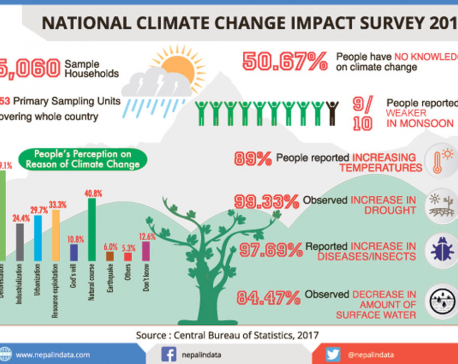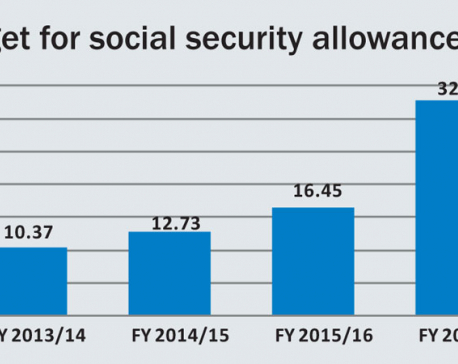
OR
Richest 1 pc bagged 82 pc of wealth created last year: Oxfam
Published On: January 23, 2018 06:00 AM NPT By: Republica | @RepublicaNepal

The report entitled 'Reward Work, Not Wealth' reveals how the global economy enables a wealthy elite to accumulate vast fortunes while hundreds of millions of people are struggling to survive on poverty pay.
REPUBLICA
KATHMANDU, Jan 22
A new Oxfam report has revealed that eighty-two percent of the wealth generated in the year 2017 went to the richest one percent of the global population.
According to the report which was launched as political and business elites gather for the World Economic Forum in Davos, Switzerland, some 3.7 billion people, who make up the poorest half of the world, saw no increase in their wealth during the year.
The report entitled 'Reward Work, Not Wealth' reveals how the global economy enables a wealthy elite to accumulate vast fortunes while hundreds of millions of people are struggling to survive on poverty pay.
The report revealed that billionaire wealth had risen by an annual average of 13 percent since 2010 -- six times faster than the wages of ordinary workers, which have risen by a yearly average of just 2 percent. The number of billionaires rose at an unprecedented rate of one every two days between March 2016 and March 2017.
“It takes just four days for a CEO from one of the top five global fashion brands to earn what a Bangladeshi garment worker will earn in her lifetime. In the US, it takes slightly over one working day for a CEO to earn what an ordinary worker makes in a year,” an Oxfam statement highlighted the major finding of the report.
“It would cost $2.2 billion a year to increase the wages of all 2.5 million Vietnamese garment workers to a living wage. This is about a third of the amount paid out to wealthy shareholders by the top 5 companies in the garment sector in 2016,” the statement said.
The Oxfam report outlines the key factors driving up rewards for shareholders and corporate bosses at the expense of workers' pay and conditions. These include the erosion of workers' rights; the excessive influence of big business over government policy-making; and the relentless corporate drive to minimize costs in order to maximize returns to shareholders.
“The billionaire boom is not a sign of a thriving economy but a symptom of a failing economic system. The people who make our clothes, assemble our phones and grow our food are being exploited to ensure a steady supply of cheap goods, and swell the profits of corporations and billionaire investors,” the statement quoted Executive Director of Oxfam International Winnie Byanyima as saying.
Women workers often find themselves off at the bottom of the heap. Across the world, women consistently earn less than men and are usually in the lowest paid and least secure forms of work. By comparison, 9 out of 10 billionaires are men.
Oxfam has called for governments to ensure our economies work for everyone and not just the fortunate few. Limiting returns to shareholders and top executives, and ensuring all workers receive a minimum 'living' wage that would enable them to have a decent quality of life, eliminate the gender pay gap and protect the rights of women workers, ensuring the wealthy pay and their fair share of tax through higher taxes and a crackdown on tax avoidance, and increasing spending on public services such as healthcare and education are some of the key recommendations made by the report.
You May Like This

99.33 pc households note more drought in last 25 years
KATHMANDU, June 22: It is no longer a hypothesis or myth. The impact of climate change is real as far as... Read More...

World's eight richest as wealthy as half humanity, Oxfam tells Davos
DAVOS, SWITZERLAND, Jan 16: Just eight individuals, all men, own as much wealth as the poorest half of the world's population,... Read More...

Up to 15 pc social security funds misused
KATHMANDU, July 12: Absence of effective monitoring and accountability has resulted in the misuse of millions under social security schemes. Read More...





Just In
- 120 snow leopards found in Dolpa, survey result reveals
- India funds a school building construction in Darchula
- Exploring opportunities and Challenges of Increasing Online Transactions in Nepal
- Lack of investment-friendly laws raises concerns as Investment Summit approaches
- 550,000 people acquire work permits till April of current fiscal year
- Fixing a win by outlawing dissent damages democracy
- MoHP cautions docs working in govt hospitals not to work in private ones
- Over 400,000 tourists visited Mustang by road last year










_20220508065243.jpg)

Leave A Comment